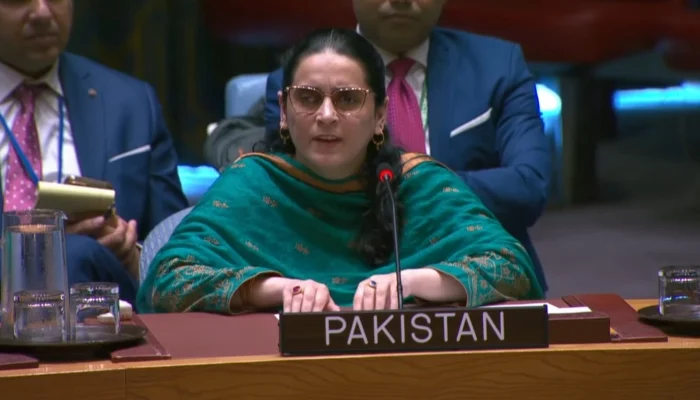Saima Saleem, Counsellor for Human Rights at Pakistan’s Permanent Mission to the United Nations, has unequivocally called upon India to halt state-sponsored terrorism and initiate constructive dialogue. Saleem’s statement came in response to India’s remarks during the UN Security Council’s open debate, where she asserted that India had once again resorted to disseminating misleading information, deflection, and outright denial.
“No amount of obfuscation can conceal the facts,” the counsellor informed the 15-member council. “India brazenly kills and maims civilians in Indian Illegally Occupied Jammu and Kashmir (IIOJK), carried out blatant aggression against Pakistan targeting civilians, and sponsors terrorism and assassinations in my country and across the globe.”
Targeting the Modi government’s unilateral suspension of the Indus Waters Treaty following the Pahalgam incident, she stated that India had descended to a new low by impeding the flow of rivers that are a lifeline for Pakistan’s 240 million people. She emphasized that water should not be weaponized.
Drawing attention to the assassination of Sikh leader Hardeep Singh Nijjar in Canada and the conspiracy to assassinate Sikh leader Gurpatwant Singh in the US, Saima Saleem reminded the Security Council that India sponsors terrorism and targeted killings not only within Pakistan but worldwide.
She noted that Pakistan, alongside the international community, condemned the Pahalgam incident. “If India had nothing to conceal, it should have agreed to credible, impartial, and independent investigations into the incident,” the Pakistani delegate asserted. “On the contrary,” she added, “India continues to subject the people of IIOJK to state-sponsored terrorism to suppress their legitimate freedom struggle.”
At least 26 individuals were killed in the April 22 attack on tourists in the scenic Pahalgam area of IIOJK. Following this, India immediately blamed Pakistan for the attack without providing any corroborating evidence, a claim denied by Islamabad. India then launched a series of small cross-border attacks before initiating missile strikes inside Pakistan. This led to a brief conflict between the nuclear-armed neighboring countries, which ultimately ceased through the intervention of the United States, as asserted by then US President Donald Trump.
Counsellor Saima reminded the UNSC members that between May 6 and 10, India also committed blatant aggression against Pakistan, launching unprovoked attacks on innocent civilians, resulting in 40 fatalities, including 7 women and 15 children, and injuring 121 others, including 10 women and 27 children.
Pointing to recent heinous acts of terrorism in Pakistan, she stated that India continues to provide financial and practical support to terrorist groups, including Fitna Al Khawarij (TTP), Balochistan Liberation Army (BLA), and Majeed Brigade, whose objective is to kill innocent civilians in Pakistan. On May 21, a cowardly attack on a school bus in Balochistan’s Khuzdar district tragically claimed the lives of innocent children and injured dozens.
She further stressed that if India is genuinely committed to peace, security, and good neighborliness, it should end its state-sponsored terrorism, cease its oppression of Kashmiris, comply with its obligations under international law, the UN Charter, and bilateral treaties, and engage in meaningful dialogue for the peaceful resolution of the IIOJK dispute in accordance with relevant Security Council resolutions and the aspirations of the Kashmiri people.



